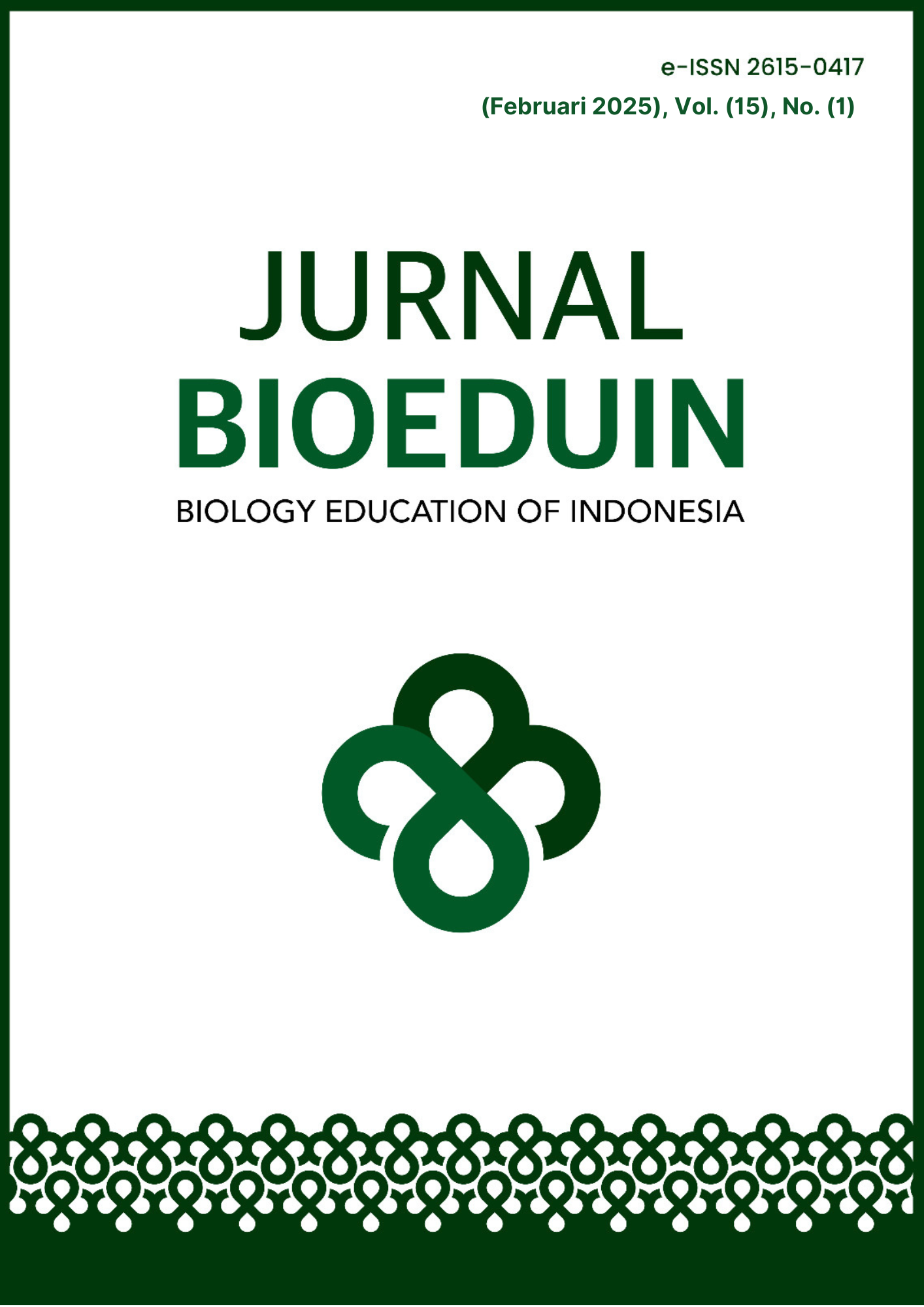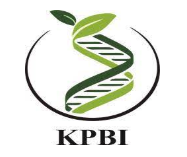Hubungan Literasi Sains dan Berpikir Kritis dengan Self-Awareness Siswa pada Materi Pencemaran Lingkungan
DOI:
https://doi.org/10.15575/bioeduin.v15i1.44146Keywords:
literasi sains, keterampilan berpikir kritis, self-awareness, pencemaran lingkunganAbstract
This study aims to analyze the relationship between science literacy, critical thinking skills, and students' self-awareness in learning about environmental pollution. The research method used is a quasi-experiment involving 32 seventh-grade students as respondents. Data were collected through a problem-based test consisting of 20 multiple-choice questions to measure science literacy and critical thinking skills, as well as a Likert scale questionnaire to evaluate self-awareness. Data analysis was performed using multiple regression techniques. The results of the study show that science literacy and critical thinking skills have a positive and significant relationship with students' self-awareness. The better the students' science literacy and critical thinking skills, the higher their self-awareness, especially in understanding and addressing environmental issues. The conclusion of this study is that improving science literacy and critical thinking skills significantly enhances students' self-awareness, which is an important element in issue-based environmental learning. This research provides insights for educators to integrate science literacy and critical thinking skills into relevant and contextual learning strategies. This effort is expected to create a generation of students who are more aware of their roles and responsibilities in preserving the environment.
References
Adnan, Mulbar, U., Sugiarti, & Bahri, A. (2021). Scientific literacy skills of students : problem of biology teaching in junior high school in south sulawesi , indonesia. 14(3), 847–860.
Ani, S., Situmorang, M., & Silalahi, A. (2021). Implementation of an Inquiry Learning Model with Science Literacy to Improve Student Critical Thinking Skills. International Journa of Insruction, 14(2), 117–138.
Aston, K. J. (2023). ‘ Why is this hard , to have critical thinking ?’ Exploring the factors affecting critical thinking with international higher education students. https://doi.org/10.1177/14697874231168341
Auerbach, A. J., & Schussler, E. E. (2017). Curriculum Alignment with Vision and Change Improves Student Scientific Literacy. 1–9. https://doi.org/10.1187/cbe.16-04-0160
Ayçiçek, B. (2021). Integration of critical thinking into curriculum : Perspectives of prospective teachers. 41(July). https://doi.org/https://doi.org/10.1016/j.tsc.2021.100895
Chen, H., Wu, C., & Chen, H. (2021). A digital role-playing game for learning : effects on critical thinking and motivation thinking and motivation. Interactive Learning Environments, 0(0), 1–13. https://doi.org/10.1080/10494820.2021.1916765
Demink-carthew, J., Netcoh, S., Farber, K., Demink-carthew, J., Netcoh, S., & Farber, K. (2020). Exploring the potential for students to develop self-awareness through personalized learning. The Journal of Educational Research, 0(0), 1–12. https://doi.org/10.1080/00220671.2020.1764467
Diana, H., & Maulina, D. (2022). Students ’ cognitive ability : its relationship with ability in scientific literacy and student self-efficacy (Vol. 1). Atlantis Press SARL. https://doi.org/10.2991/978-2-38476-060-2
Dichev, C., & Dicheva, D. (2017). Towards data science literacy. Procedia Computer Science, 108(June), 2151–2160. https://doi.org/10.1016/j.procs.2017.05.240
Ekamilasari, Permanasari, A., & Pursitasari, I. D. (2021). Students ’ critical thinking skills and sustainability awareness in science learning for implementation education for sustainable development. 1(1), 121–124.
Ennis, R. H. (1993). “Critical Thinking Assessment.â€
Flavian, H. (2016). Towards teaching and beyond: Strengthening education by understanding students’ self-awareness development. Power and Education, 8(1), 88–100. https://doi.org/10.1177/1757743815624118
Kang, J., & Hong, J. H. (2021). Framing effect of environmental cost information on environmental awareness among high school students. Environmental Education Research, 27(6), 936–953. https://doi.org/10.1080/13504622.2021.1928607
Kencanasari, V., Surahman, U., & Yudi Permana, A. (2019). The instrumental framework to measuring environmental awareness. Innovation of Vocational Technology Education, 2, 101–109.
Larsson, K. (2017). Understanding and teaching critical thinking — A new approach. 84(December 2016), 32–42. https://doi.org/10.1016/j.ijer.2017.05.004
Ma, X., Zhang, Y., & Luo, X. (2021). Students ’ and teachers ’ critical thinking in science education : are they related to each other and with physics achievement ? Research in Science & Technological Education, 00(00), 1–25. https://doi.org/10.1080/02635143.2021.1944078
Morais, F., Silva, H., Dominguez, C., & Nascimento, M. M. (2019). Perceptions of portuguese university teachers about critical thinking educational practices. 2, 223–239. https://doi.org/10.1007/978-3-030-20954-4
OECD. (2018). PISA 2018 Assessment and Analytical Framework. https://doi.org/https://doi.org/10.1787/b25efab8-en
Okolie, U. C., Igwe, P. A., Mong, I. K., Nwosu, E., Kanu, C., & Ojemuyide, C. C. (2021). Enhancing students ’ critical thinking skills through engagement with innovative pedagogical practices in Global South. Higher Education Research & Development, 0(0), 1–15. https://doi.org/10.1080/07294360.2021.1896482
Palines, K. M. E., & Cruz, R. A. O. (2021). Facilitating factors of scientific literacy skills development among junior high school students.
Pamungkas, Z. S., Aminah, N. S., & Nurosyid, F. (2018). Students critical thinking SKILL in solving scientific literacy using a metacognitive test based on scientific literacy. Jurnal Ilmiah Pendidikan Fisika Al Biruni, 07(October), 161–169. https://doi.org/10.24042/jipfalbiruni.v7i2.2909
Pujiati, A. (2020). Analisis Literasi Sains dan Self Awareness pada Pembelajaran Kimia Secara Online di Masa Pandemi Covid-19. 97–104.
Solheri, S., Azhar, M., & Yohandri, Y. (2022). Analysis of ethnoscience integrated environmental literacy for junior high school. JPBI (Jurnal Pendidikan Biologi Indonesia), 8(2), 178–188. https://doi.org/10.22219/jpbi.v8i2.17657
Thaintheerasombat, S. (2022). The Development of a Self-Awareness Skill for High School Students with the Process of Social and Emotional Learning. Journal of Educational Issues, 8(2), 741. https://doi.org/10.5296/jei.v8i2.20395
Tran, L., Van Huynh, S., Dinh, H. D., & Giang, V. T. (2019). Improving the self-awareness capacity of secondary school students by forming a school counseling model based on student capacity development orientation in Vietnam. Problems of Education in the 21st Century, 77(6), 722–733. https://doi.org/10.33225/pec/19.77.722
Tuttle, M. J., Cejas, D., Kang, D., & Muchaamba, F. (2023). Promoting science literacy and awareness across the globe : the role of scientists as science ambassadors. Journal of Microbilogy and Biology Education, 24(2).
Vadivel, B., Namaziandost, E., & Saeedian, A. (2021). Progress in english language teaching through continuous professional development — teachers ’ self-awareness , perception , and feedback. 6(November), 1–10. https://doi.org/10.3389/feduc.2021.757285
Wati, R., Rachman, I., & Kodama, Y. (2018). Improving critical thinking skills and environment caring attitude through integrated environment-based learning model. 2(1), 69–73.
Wen, C., Liu, C., Chang, H., & Chang, C. (2020). Students ’ guided inquiry with simulation and its relation to school science achievement and scientific literacy. Computers & Education, 149(January), 103830. https://doi.org/10.1016/j.compedu.2020.103830
Downloads
Published
How to Cite
Issue
Section
Citation Check
License
Copyright (c) 2025 Lusy Fajarwati

This work is licensed under a Creative Commons Attribution-ShareAlike 4.0 International License.
Authors who publish in Jurnal BIOEDUIN agree to the following terms:
- Authors retain copyright and grant the journal right of first publication with the work simultaneously licensed under a Attribution-ShareAlike 4.0 International (CC BY-SA 4.0) License that allows others to share the work with an acknowledgment of the work's authorship and initial publication in this journal.
- Authors are able to enter into separate, additional contractual arrangements for the non-exclusive distribution of the journal's published version of the work (e.g., post it to an institutional repository or publish it in a book), with an acknowledgment of its initial publication in this journal.
- Authors are permitted and encouraged to post their work online (e.g., in institutional repositories or on their website) prior to and during the submission process, as it can lead to productive exchanges, as well as earlier and greater citation of published work (See The Effect of Open Access).









